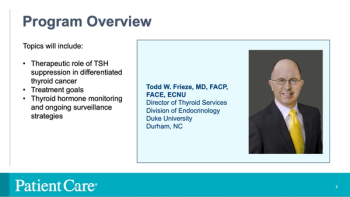
Todd W. Frieze, MD, discusses the therapeutic role of TSH suppression in differentiated thyroid cancer, as well as treatment goals and ongoing surveillance strategies.

Todd W. Frieze, MD, discusses the therapeutic role of TSH suppression in differentiated thyroid cancer, as well as treatment goals and ongoing surveillance strategies.
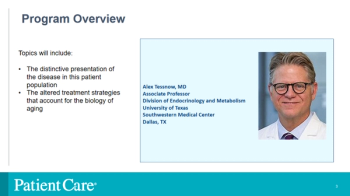
Alex Tessnow, MD, reviews the presentation of hypothyroidism among elderly patients and outlines key considerations for treatment.
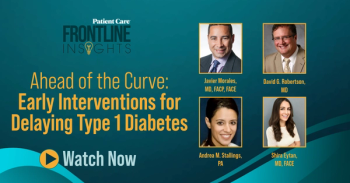
Panelists discuss how delaying intervention during Stage 2 Type 1 diabetes increases the risk of diabetic ketoacidosis and complications at diagnosis, while also potentially accelerating beta cell destruction and reducing the window for preservation therapies.

Panelists discuss how Type 1 diabetes progresses through distinct stages, from initial autoimmunity with normal blood glucose (Stage 1), to dysglycemia without symptoms (Stage 2), to clinical diagnosis with symptoms (Stage 3), marking critical intervention points for treatment and management.

Panelists discuss how screening for Type 1 diabetes should focus on identifying high-risk individuals through family history, genetic markers, and autoantibody testing, while emphasizing the importance of early detection to prevent diabetic ketoacidosis at diagnosis.
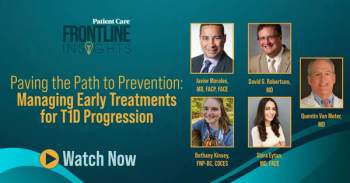
Panelists discuss how delayed intervention in stage II type 1 diabetes can accelerate β cell destruction, leading to more severe clinical onset, increased risk of serious complications like diabetic ketoacidosis, and poorer long-term outcomes.

Panelists discuss how type 1 diabetes progresses through distinct stages, beginning with asymptomatic autoantibody presence, followed by dysglycemia, and ultimately manifesting with classic symptoms like excessive thirst, frequent urination, and unexplained weight loss.

Panelists discuss early testing with autoantibody screening for type 1 diabetes in at-risk individuals, particularly those with family history or genetic predisposition, to avoid DKA at diagnosis and allow time for patient and family preparation.

Panelists discuss the burden of living with type 1 diabetes, including high levels of stress and anxiety and talk about how they help patients manage the daily requirements.
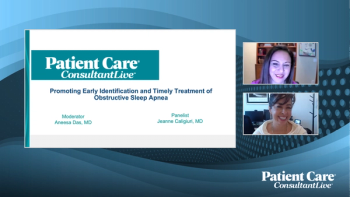
Panelists discuss how obstructive sleep apnea (OSA) disrupts normal breathing during sleep through repeated upper airway collapse, leading to fragmented sleep patterns, daytime fatigue, and potential long-term health complications if left untreated.

Panelists discuss how Type 1 diabetes imposes significant physical, emotional, and financial burdens on patients through the lifelong need for insulin therapy, blood glucose monitoring, lifestyle modifications, and management of potential complications.

Experts talk about the impact of a collaborative and supportive patient-provider relationship in the management of IBS-C and CIC.

Thought leaders explore premature treatment discontinuation and some of the reasons leading to it, such as time to response and safety in regards to the use of prescription therapies for IBS-C and CIC.

Experts discuss the current use of OTC and review guidelines for prescription treatments for IBS-C and CIC.

Thought leaders review prevalence, common symptoms, and patient burden of IBS-C and CIC.

The lead investigator of the largest clinical trial program in people with CAH discusses the condition, its burden, and the novel drug just approved that will change lives.

Auchus details findings from the unique study of the CRF-1 antagonist crinecerfont, the first new therapy for CAH approved in 70 years.

The new nonsteroidal topical treatments for atopic dermatitis are targeted and modify the disease process, explains thought leader Shahriari in this year's video series.
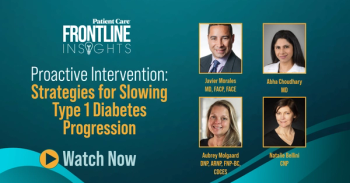
Panelists discuss key insights on the importance of early screening for T1D, the role of antibody testing in identifying at-risk individuals, and the need for timely intervention to preserve ß-cell function and optimize long-term management strategies for better patient outcomes.

Panelists discuss how teplizumab infusion requires specialized medical facilities equipped to manage intravenous therapy, monitor for potential adverse effects, and provide appropriate care during treatment to ensure patient safety and efficacy.

Panelists discuss how teplizumab, an anti-CD3 monoclonal antibody, delays the onset and progression of type 1 diabetes by modulating immune response and preserving ß-cell function in high-risk individuals.

Panelists discuss screening for T1D for individuals at higher risk, such as those with a family history of T1D, autoimmune conditions, or certain genetic markers, to identify early signs of the disease and enable timely intervention.

Panelists discuss how antibody screening tests for type 1 diabetes (T1D), including tests for insulin autoantibodies (IAA), glutamic acid decarboxylase (GAD) antibodies, and other markers can help identify individuals at risk for developing the disease before clinical symptoms appear, enabling earlier monitoring and potential intervention.

Panelists discuss how delaying intervention in stage 2 type 1 diabetes, when dysglycemia is present but clinical symptoms have not yet developed, can lead to further ß-cell deterioration and worsen long-term glycemic control, ultimately increasing the risk of complications.

Panelists discuss how the progression of type 1 diabetes unfolds through distinct stages, from the preclinical phase of autoimmunity to the onset of clinical diabetes, emphasizing the importance of early detection and intervention to improve patient outcomes.

Panelists discuss how adhering to screening guidelines for type 1 diabetes enables early detection and intervention, improving patient outcomes and delaying disease progression through timely treatments like teplizumab.

Panelists discuss how managing the clinical, financial, and quality-of-life burdens of type 1 diabetes (T1D) requires early intervention, proactive care strategies, and the use of treatments like teplizumab to improve patient outcomes and reduce long-term complications.
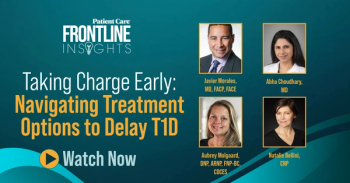
Panelists discuss how antibody screening for type 1 diabetes can identify at-risk individuals early, enabling proactive monitoring and intervention to delay or prevent disease onset.

Panelists discuss how teplizumab therapy can delay the onset and progression of type 1 diabetes (T1D) by preserving β-cell function and reducing the risk of developing full-blown diabetes in at-risk individuals.

Panelists discuss clinical use of teplizumab including patient selection, navigating approval processes, and managing the 14-day infusion regimen to optimize outcomes and delay the progression of type 1 diabetes.